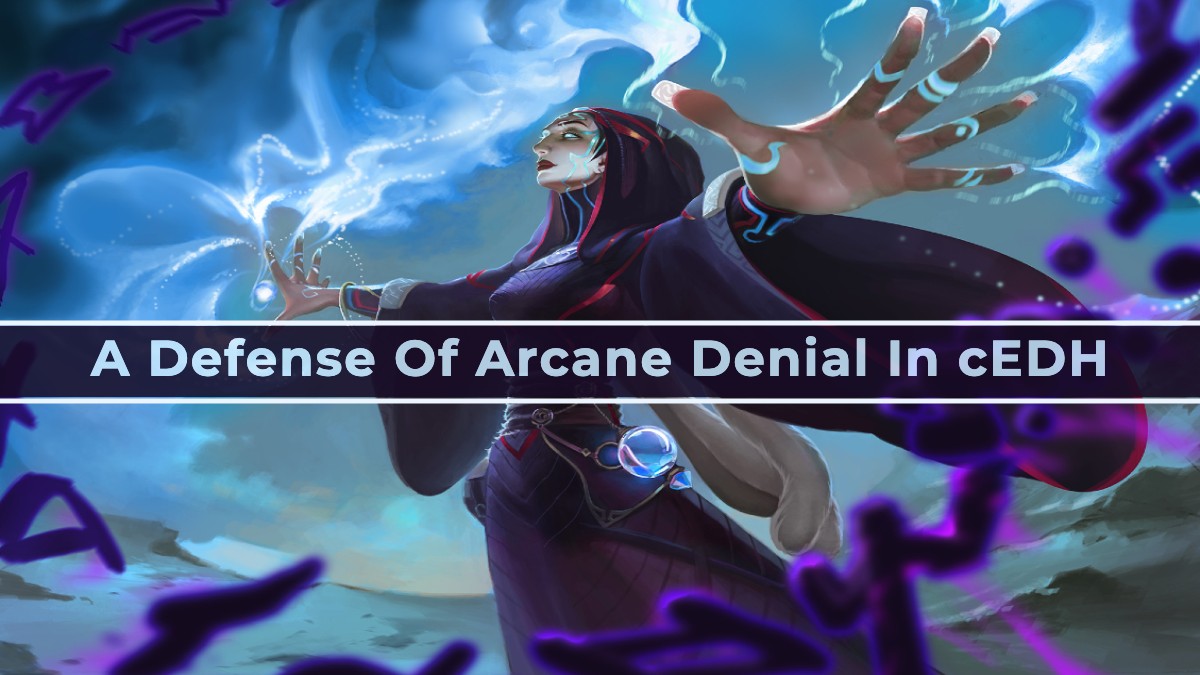A Defense of Arcane Denial in cEDH

Arcane Denial by Xi Zhang
Arcane Denial
Card advantage in cEDH is a tricky thing to understand, especially for those new to the format, and in order to understand why I'm a big advocate for playing Arcane Denial
First off, a basic understanding of what I'll be counting as the "cards" in our card advantage calculation. Permanents on board, cards in hand, and cards castable from exile or in the Command Zone all count. Those are the four zones that matter for the sake of the card advantage discussion (if you want to be really technical about it, cards on the stack could theoretically count as well, but that's not so significant a part of the calculus as to require deep discussion), but for the sake of this article we'll be primarily focusing on cards in hand.
The Parity Breakdown
Moving from this, we can next discuss the difference between relative and absolute parity, as well as relative and absolute card advantage. Parity is pretty simple: it refers to when neither advantage nor disadvantage exists, i.e., an equilibrium of resources is in place. This is relative in the case of equilibrium between a select few players in the game, or absolute when in place between all players. Relative card advantage and absolute card advantage reflect the same definition, albeit in a state out of equilibrium. While simple enough in theory, this difference between relative and absolute is critical in understanding Commander gameplay.
This is where the first snag against absolute card advantage as a reliable metric comes into play: in EDH, the game always begins with you in a position of absolute card disadvantage. Regardless of whether or not any individual player is using a Partner, a Companion, or both, the greatest number of cards at your disposal beginning at turn zero - the point when card parity should theoretically be at its maximum - is capped at ten (two Partner Commanders, a Companion, and seven cards in hand), whereas the sum amount of resources between the three opponents you'll be facing down is anywhere from twenty-four to thirty. At the absolute best, not accounting for mulligans, the closest to bridging the resource gap which can be anticipated when starting an EDH game is your ten cards against your opponents' collective twenty-four. This means that, while cEDH games do traditionally start somewhere between relative and absolute parity, they also start with each player in a position of absolute card disadvantage.
That said, it is still certainly possible to reach a position of absolute card advantage, although such a state is usually a winning one as opposed to simply a good one when it comes to cEDH. This is because, given the difficulty in attaining it, reaching absolute card advantage is representative of a monumentous feat. Casting Ad Nauseam
It is because of this transitory approach that board wipes are so ubiquitous and important in Commander as a whole, as opposed to traditional single-spot removal. I shouldn't have to explain how valuable cards like Cyclonic Rift
Counterspell Erosion
Moving to the world of counterspells, these are almost always one-for-one, which maintain relative parity with an individual opponent, but consistently erode relative advantage against the other two players. Beyond this inherent flaw, some of the best counterspells out there are actually two-for-ones (Force of Will
No, I'm not sorry.
I'm not saying this to diminish the importance of counterspells in cEDH; my absolute favourite deck to play is Grand Arbiter Augustin IV
The example math for casting a counterspell during seven-card absolute parity is, strictly with respect to hand sizes, frequently as follows: the controller of the countered spell goes from seven to six, the caster of the counterspell goes from seven to six, and the other two players remain unchanged. In effect, what was absolute parity has been reduced to relative parity with only a third of the total opponents, and now a situation of relative card disadvantage exists between the counterer and the two untargeted players.
The Math of Arcane Denial
The example math for casting Arcane Denial
Does this mean I would go readily replacing Force of Will
Beyond Parity
Moving beyond relative advantage and the allure of parity, it's worth realising that Arcane Denial
In a meta overrun by the likes of Winota, Dockside Extortionist
A Brief Wrap-Up
Arcane Denial
What do you think? Will you stick with the more narrow, one-mana responses? Or are you willing to reevaluate the two-mana, catch-all, cantripping counterspell?
Read more from Harvey McGuinness on MTGStocks.